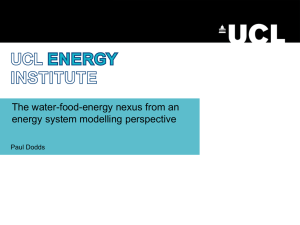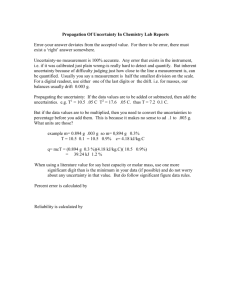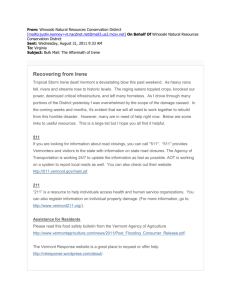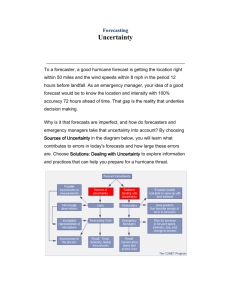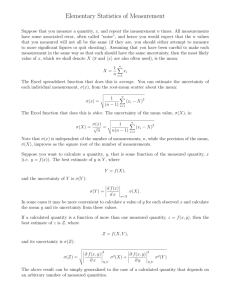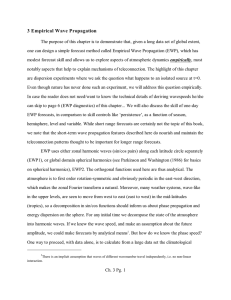Energy Policy - Regulatory Policy Institute
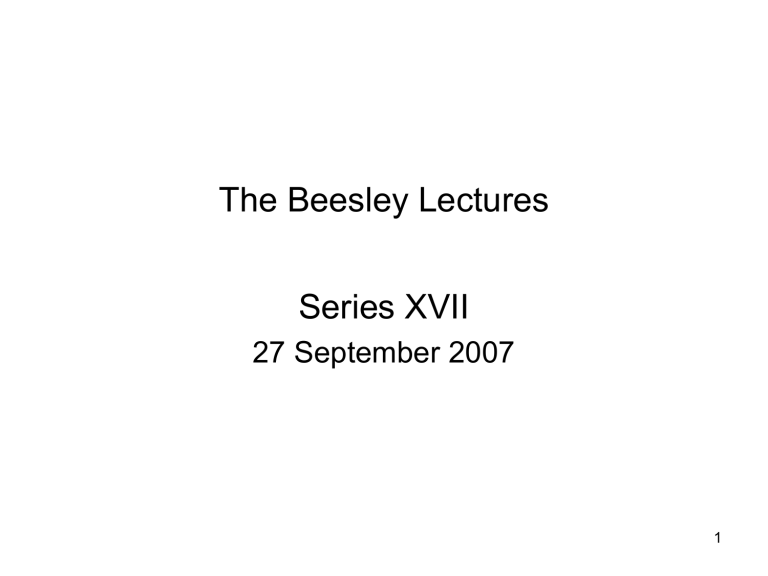
The Beesley Lectures
Series XVII
27 September 2007
1
Energy policy: a time to stop pretending?
George Yarrow
Regulatory Policy Institute, Oxford
2
The environmental challenge
As a result of increasing public policy concern about the effects of atmospheric emissions of waste gases … environmental regulation can be expected to be the major issue facing the ESI, worldwide, in the 1990s. Since the new regulatory framework in Britain was not developed with environmental problems in mind, there is a danger that, at the international level, it will come to be treated as a mere sideshow to the main (environmental) event. If so, that would be a pity; for, as we hope we have shown, the information the experiment promises to yield will be relevant in many contexts, not least in the context of environmental regulation itself. The reforms may not be widely copied, but they do merit close scrutiny.
John Vickers and George Yarrow, “The British Electricity Experiment”,
Economic Policy, 1991.
3
The policy response to the challenge
• Generally poor, for many reasons, some of which are intellectual failures, including failures of policy design.
• Main theme: lessons learned from ‘economic’ regulation have not been effectively used in environmental regulation.
• Poor institutional design is exacerbating the problems, encouraging unproductive bureaucratic rivalry (Punch and
Judy rather than constructive discourse).
• In relation to ‘economic’ regulation, there has been some resulting erosion of key principles and some repoliticisation.
• Among other things, politicisation leads to loss of focus on substantive issues and neglect of procedural disciplines.
(Parris: politicians are not interested in government ).
• Energy White Paper should be assessed in this wider, not entirely favourable, context.
4
What has been the achievement?
• A new institutional set-up in the energy sector, with much more effective information processing capacity (acquisition, storage, transmission and use of information) than the old monopoly arrangements.
• By institution is here meant a structure comprising ‘rules’ or patterns of conduct -- laws, by-laws, regulations, codes, norms, customs, conventions, etc. – which govern or characterise a set of social/economic interactions. Visible parts of the coordinating mechanisms of the economy.
• Markets are examples, as are regulatory agencies.
• Unbundling (of strands of policy), delegation (independent regulation) and the division of labour have been key characteristics of policy, with beneficial effects (cf the words on the reverse side of the new £20 note) .
• UK energy sector as the ‘poster child’ of global liberalisation.
• An achievement that has been the work of many hands.
5
Earth to economists, come in please …
• Most common approach to policy nowadays:
“Conventional wisdom neoclassicism” (CWN) – a set of frames and heuristics such as “market failure”, the “costbenefit criterion”, “expected utility”, etc.
• Example: the discount rate assessment in the Stern
Report – critically important for its conclusions.
• Distinguish from historical neoclassicism: a set of different schools of thought that developed in the later
19th century (Anglo-American marginalists, Austrians, the Lausanne School, the Swedish schools, etc)
• Coase: not so much that it is wrong, more just that it is irrelevant. See also Leontief.
• Coase: economics is the study of the working of social institutions which bind the economic system together.
6
A quick aside on the conventional wisdom
• Term introduced by Galbraith for generally supported ideas that may or may not be true
• CW possesses inertia: convenient, appealing, assumed views may be difficult to dislodge:
– The enemy of the conventional wisdom is not ideas but the march of events.
– The conventional view serves to protect us from the painful job of thinking.
– Introduces avoidable risks/hazards: collapse of a CW can trigger crisis.
• The 364 (and many more):
– We, who are all present or retired members of the economics staffs of
British universities, are convinced that:
(a) there is no basis in economic theory or supporting evidence for the
Government’s belief that by deflating demand they will bring inflation permanently under control and thereby induce an automatic recovery in output and employment; …
7
Three intellectual anchors
• Ronald Coase ( The nature of the firm; The problem of social cost)
– The new institutional economics.
• Friedrich von Hayek ( The pretence of knowledge, Nobel Lecture,’74 )
– The price system as a communication network
– Competition as a discovery procedure
– The danger of ‘pretence of knowledge’ in policy making
– (Rule-making/regulation as a discovery process)
• Amos Tversky and Daniel Kahneman (Judgment under uncertainty: heuristics and biases, ‘ 74 )
– The importance of anchors, frames and descriptions
– ‘Expert problems’ (cf the pretence of knowledge)
– Expected utility theory: born 1942; acquired Norwegian Blue status circa 1974, at least for practical policy making purposes,
– But beware of making too much of ‘biases’: labs vs actual decisions
• It’s all about information.
8
Signs of change: social science
• The rediscovery of uncertainty (Knight, Keynes, Hayek): see for eg Weitzman’s review of Stern, 2007, for JEcLit
• In public discourse: Taleb/Finkelstein/Mayo/Kay
• John Kay ( The Failure of Market Failure , Prospect magazine, August 2007)
– If the partial genius of market economies lies in their capacity to achieve co-ordination without a co-ordinator, the greater genius lies in their ability to innovate and adapt in an environment of uncertainty and change. (cf J S Mill’s “a competition by many degrees more propitious to the progress of improvement than any uniformity of system” ).
– That insight -- the economics of Friedrich Hayek (concerned with the dynamic capacity of a market economy to experiment and innovate) … -- is the lesson the left needs to learn from the right.
• In today’s conditions it’s a lesson for the right as well.
9
Signs of change; physical science
• Complexity in nature, Cambridge conference, August
2007, reported in New Scientist, 18 August 2007:
– … the discovery of tipping points has also unmasked growing uncertainty about the reliability of conventional climate models.
– Our models are being over-interpreted and misinterpreted. They are getting better, I don’t want to trash them per se. But as we change our predictions, how do we maintain the credibility of the science? Over-interpretation is already leading to poor financial decision-making. We need to drop the pretence that they are nearly perfect (cf Hayek)
– There are too many unknown unknowns for probabilistic predictions (cf Keynes “About these matters there is no scientific basis on which to form any calculable probability whatever. We simply do not know.” )
– Policy-makers think we know much more than we actually know.
We need to be more open about our uncertainties.
10
A Rumsfeld moment, and an indictment
• The policy making process has not made good and effective use of things that we know.
– The lag in the development of public concerns about climate change means there is much more to be learned from energy policy 1980-2007 than might have been anticipated at the outset.
– That learning/discovery (from energy policy experience) is not being effectively applied to environmental regulation
• There has been and is a pretence to knowledge that we don’t have.
– This leads directly to poor policy development (cf demand management policy in the 1970s)
– More importantly, it chills discovery. Why seek for knowledge you think you already have? Attentiveness declines, complacency flourishes.
– Such pretence can create unnecessary risks/hazards.
11
Some lessons from the past …
• The incalculable benefits of competitive processes … the
“greater genius”.
• The ability nevertheless to reason about competition: e.g. in a given context, how significant might ‘discovery’ be?
• The frame: changing information conditions and sequential learning, etc. We know that what we know tomorrow will be different from what we know today, but in unknown ways.
• It is not just about competition: similar arguments apply in relation to all rule-making that affects the discovery capacity of relevant institutions. Eg. non-discrimination principles.
• Markets as institutions of learning/discovery.
• Regulatory agencies as institutions of learning/discovery
• Failure rates in discovery can be relatively high. Not an activity for those with faint hearts or those who fear failure.
Importance of trial and error learning.
12
… applied to future environmental policy
• Lack of knowledge plus a view that relevant knowledge can be acquired puts a premium on discovery.
• Competition -- a discovery procedure that, from experience, works extremely effectively -- becomes more, not less, important in this situation.
• The discovery processes/procedures rely on sets of rules (institutions), which themselves require discovery and development.
• This is the task that faced regulators promoting energy market liberalisation, and which now faces environmental policy makers.
• How to build institutions with effective capabilities to experiment, innovate and adapt in the face of uncertainty and change?
13
New problems, new institutions
• The task of creating new institutions for the conduct of environmental policy is of critical importance.
• Effective institutional structures reflect purposes and context: Eg
Ofgem is not designed for the major environmental challenges, which give rise to identifiable and distinct institutional requirements.
• Keyworth and Yarrow: the UK (energy/environment) institutional set up, RCEP 1998; the ‘system operator’ as an institutional form directed at a connected set of third-party impacts, Defra 06, RPI 07.
• GB comparative advantage in design? And know-how is transferable.
• But … don’t forget that better ‘economic’ regulation facilitates better environmental regulation. Competitive markets will discover more effective ways of achieving environmental objectives. Incentive regulation can help promote innovation in networks (although incentive regulation is a lot easier to get right in theory than in practice). These are not just abstract arguments: offshore transmission, connecting the Scottish Islands, the GB queue.
14
The Energy White Paper (EWP)
• The EWP covered a broad range of issues but, compared with the policy challenges, was relatively restricted in scope.
• The EWP was developed in a context of no overall design for different strands of public policy: ‘economic regulation’ (networks, wholesale and retail energy markets), climate change policy (ETS, ROCs, etc.) and technology policy.
• Increasing entanglement, tending to dysfunctional conflicts within the policy making process.
• The EWP does not address the design issues – which appear not to be being adequately addressed anywhere.
15
Assessing the EWP: the counterfactuals
• Should there have been an EWP? Counterfactual: what if no
EWP? Nuclear issues might be central to that assessment.
• Taking the production of an EWP as a given, what counterfactuals are interesting?
• The ‘Say’s law’ of regulation: supply creates its own demand.
– Every Tom, Dick and Harry is liable to knock on the door asking for “something to be done” about this or that ‘problem’ in the marketplace.
– … the temptation for governments to give existing regulatory agencies new powers and duties is exceptionally strong.
Established agencies are conveniently on hand and potentially available to be used for new purposes.
• The decision to publish an EWP created risks. Relevant to consider how the EWP handled those risks. Verdict: pretty well.
16
Screening statistics
• Pages = 343
• Number of references to “failure” = 10
• References to market failure = 6
• References to technological failure = 4
• References to government/regulatory failure = 0
• Low frequencies (cf Stern Chapter 2: 18, 6, 6, 0, 0), and all is redeemed by:
– 3.12 The DE (distributed energy) challenge is therefore to make sure that new market opportunities are identified, that the market and regulatory environment is “user-friendly” for smaller participants, that potential barriers are identified and addressed, and that genuine [my emphasis] market failures are resolved.
17
Holding the line, for now
• Our strategy continues to be based on the principle that independently regulated, competitive energy markets, are the most cost-effective and efficient way of delivering our objectives.
• Resisted temptation to load GEMA/Ofgem with new objectives
– an elephant trap avoided.
But …
• Reasoning appears to rest on a ‘static’ frame of reference
(“cost-effective and efficient”) not on the ‘greater genius’
(discovery). This could lead to a bias toward under-valuation of markets and of what has been achieved to date.
• If new institutions of environmental policy are not developed, this defensive position is unlikely to be sustainable in the longer term.
18
Avoiding specific risks 1: capacity payments
• Theory of capacity payments explained in Vickers and Yarrow
(1991). They are a form of mandated, option contract.
• Implemented in England and Wales 1990-2001. Plenty of evidence. EWP looks at the evidence and concludes:
– 5.1.20 Our analysis of possible interventions in the form of capacity mechanisms that could incentivise firms to build and/or maintain additional spare generation capacity has shown that whilst they have the potential to improve security of supply outcomes, they could impose significant costs and so may not provide an overall benefit to the UK. There are also risks associated with the design and implementation of such mechanisms which can lead to unintended and undesirable consequences.
• Fair summary: sound learning from experience.
• Conservative Party position on this has also evolved.
19
Avoiding specific risks 2: strategic storage
• Similar conclusions for strategic storage. (In a lot of policy discussion, the word ‘strategic’ is used as a euphemism for
‘uneconomic and seeking subsidy’. Best to keep hands on wallets when it appears.)
• 119 The analysis of the option to build strategic storage, in fact, did not resolve the uncertainty over the impact such a Government intervention would have on the UK market. Strategic storage would dull the incentives for commercial investment into storage, thus reducing the volume available commercially, and possibly reducing the overall level of security of supply.
• That is, there might well be crowding out and regulatory risk in relation to periods of system stress, which are critical periods for determining investment incentives.
• Strategic storage shows the importance of descriptions for decisions. Dedicated storage facilities vs gas fields in GB/France comparisons.
20
A new nuclear power programme?
• Consultation alongside EWP.
• … the Government’s preliminary view is that it is in the public interest to give the private sector the option of investing in new nuclear power stations. This view is subject to the consultation we are launching on this issue alongside this White Paper. However, if the Government confirms this preliminary view, it would be for the private sector to fund, develop, and build new nuclear power stations in the UK, including meeting the full costs of decommissioning and their full share of waste management costs.
• Safety and RWM issues are of great significance.
• RWM shows again the importance of descriptions: in this case the artificial distinction between “storage” and
“disposal” has been unhelpful in the development of policy.
21
Ill-conceived environmental regulation 1: real time display meters
• Metering a difficult area: at the limits of unbundling.
• Difficult ground can be conducive to irrationality: lack of clear positions provides greater opportunities to wander.
• Eg … we have decided that between 2008-2010, real time displays, will be available free of charge to any household that requests one.
• That shows great generosity with other people’s property.
• No evidence that this will be anything other than a substantial waste of resources, and a source of distortions of competition in metering and supply markets. Opposed by just about everyone.
• Sometimes the wolf of regulatory/political uncertainty really is at the gate, as now in relation to metering policy.
Requires sorting, with some urgency.
22
Ill-conceived environmental regulation 2:
ROCs
• Another unloved strand of UK policy, found to provide poor value for money by NAO, European Commission, etc.
– relative to demand reduction, feed in tariffs, etc.
• The policy has a logic, but among other things the significance of supply-side stickiness was not adequately recognised (compare with NHS). A significant fraction of money thrown in on the demand side goes into rents (eg because of planning constraints).
• Competition for rents can, depending on circumstances, be productive (innovation) or unproductive (political lobbying, delay). In this case it tends to the latter.
• Better to have addressed supply-side problems first. Better now would be to travel a different road.
• Healey’s law: when in a hole, stop digging. Index the buy-out price. If banding (inadvisable), index the allocation ratios?
23
What about technology policy?
• ROCs are an important issue because they exhibit the kind of entanglement between competition, environmental and technology policy that is liable to lead to poor regulation.
• Because of value-for-money problems, it is now proposed to band the ROCs according to technology.
• This is a system based on administrative categories which introduces discontinuities in incentives that do not reflect underlying (more continuous) economic realities.
• Fixes relative subsidy rates, which should depend on prices.
• Expect to see unproductive political competition (rent transformation) for discriminatory advantages (because principles of technological neutrality and non-discrimination have been abandoned), and also distortions of competition -not concealed by attempts to define a very wide market (in terms of all generation, not just renewable generation).
• This type of approach is not good for promoting discovery.
24
Is there a case for a technology component to energy/environmental policies?
• Technological development will likely be critical. Looking forward, we stand before a sea of unknowns: there is a lot to be discovered.
• Usual market failure arguments for TP are weak: experiment and innovation are things that markets do well, not poorly.
• May be a second-best argument based on limitations of other policy.
Eg if political influences lead to an unduly low carbon price in ETS
(which is arguable), or if the scope of ETS is insufficient (which is manifestly the case), incentives for innovation may be damped.
• But subsidising inputs, picking winners, etc. has an appalling track record – cramped by conventional wisdoms, and by Leviathan’s notoriously limited imagination. Energy regulation has sought to move from input-based to output-based payments (another lesson?)
• Might it be time for a prize system? If there is to be competition for rents, why not set it up as innovative competition rather than political competition?
• Given importance of technological discovery, was transfer of policy to a new government department a wise move?
25
Today’s policy drift
• The development of environmental regulation, or rather the lack of development, is not making effective use of what we know.
• Poor policy design is tending toward the stimulation of dysfunctional competition in relation to the distribution of income and power, including between and within agencies of government.
• The envelope theorems of economics warn of the problems: in well functioning markets, distributional effects of change are an order of magnitude greater than (static) efficiency effects.
• Distributional conflicts can be damped by good regulation (e.g. via principles-based approaches), but they can be a serious risk to progress and discovery when regulation is deficient or weak.
• Today’s tendencies could lead to a range of future scenarios characterised by different degrees of bureaucratic/political dysfunction.
• With respect to environmental regulation, the most obvious implication of poor policy development would be an unnecessarily high unit cost for carbon abatement, and a correspondingly lower level of carbon abatement at any point in time.
26
Unbundling/disentanglement and re-design
• Policy issues are complex, progress requires that they be broken down into manageable components, and effective institutional design allows for this division of labour to be co-ordinated (cf markets), so that the parts work together.
• Institutional arrangements characterised by high capacities to adapt and innovate need to be ‘discovered’. This is the story of energy market liberalisation.
• Institutional innovations will include new markets and new market rules, but they will also include new approaches to regulation, not yet developed.
• The discovery process in environmental regulation requires a huge kick-start/kick-up-the-backside. UK policy is not yet in the right ballpark.
• The Climate Change Committee sounds fine in principle – independent advice, etc, but ….
• One day a week from one of the great and the good … so that’s alright then? Hmm. A pretence of progress?
27
Concluding thoughts …
• Waverman’s “hard-headed intellectualism” (HHI), 2003
• Wrt climate change policy, current know-how is highly limited and longer term outcomes are highly uncertain
• Without losing sight of ultimate purposes (which are outcomebased), policy would do well to ‘discover’ more effective discovery processes (institutions), a task requiring imagination, rigor, and care/commitment.
• Never give up the study of letters, but have such young men with you as are always learning and who rejoice more in learning than in being drunk. Ealwhine (Alcuin), pioneer of the new learning, from the court of Charlemagne to the lads back home in Northumbria, circa 790.
• 2007 revised, best regulatory practice version: Never give up the study of letters, but have such young men and women (especially women) with you as are always learning and who rejoice more in learning than in being drunk.
28

